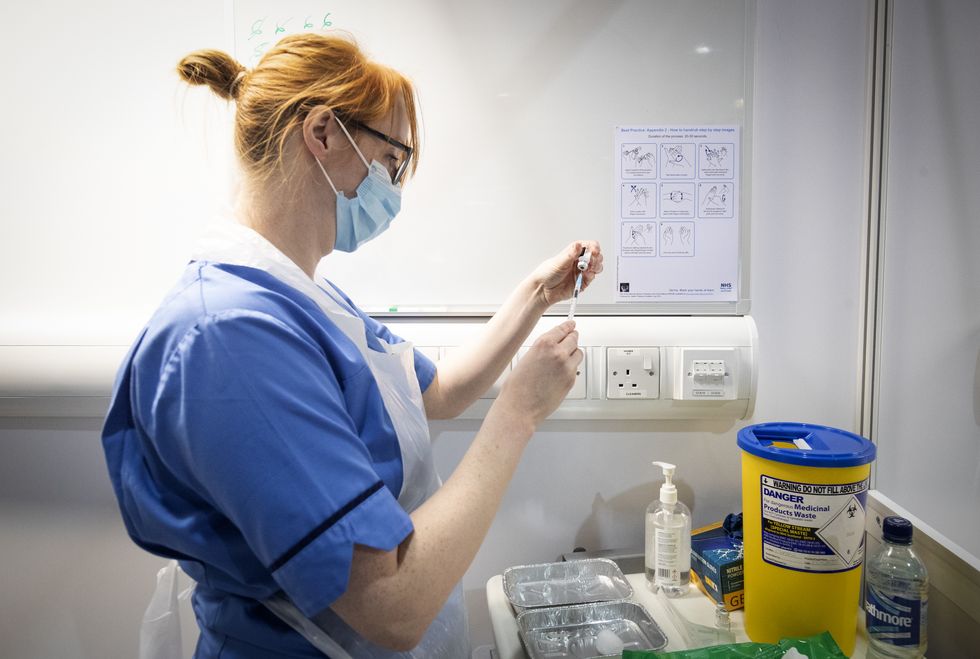Scientists may have finally cracked why people are mysteriously falling ill after Covid

Researchers have found an early variant of Covid heightened the risk of post-Covid symptoms
|Getty Images

The virus variant has an impact on the risk of developing a post-COVID-19 condition, researchers found
Don't Miss
Most Read
Latest
A new study has revealed the risk factors for developing a post-Covid infection.
It is the latest in a series of studies to carry out a post-mortem on the pandemic.
GB News has previously reported on how rates of respiratory illnesses are rocketing in the wake of the pandemic.
Now researchers have turned their attention to a concerning trend that emerged during the first wave of Covid.
As the pandemic kicked off, there were reports of persistent post-infection symptoms.

An Omicron infection was less associated with post-COVID-19 condition than earlier virus variants
|Getty Images
The World Health Organization (WHO) refers to such new or persistent symptoms twelve weeks after a Covid infection that cannot be explained by other causes as a post-COVID-19 condition.
In a recent study, scientists led by the University Medicine Halle evaluated the information from 109,707 participants in the German National Cohort (NAKO Gesundheitsstudie) on their self-reported health status with respect to post-infection symptoms. The survey took place in autumn 2022, in retrospect of the pandemic.
At the time of the survey, more than 80 percent of respondents had received three or more COVID-19 vaccinations and 60 percent reported that they had already been infected with the virus.
In the online questionnaire, the researchers asked about 21 possible post-COVID symptoms such as physical exhaustion, cardiovascular problems and cognitive impairment.
Thirty-five percent of those who experienced a Covid infection reported at least one persistent post-COVID-19 symptom four to twelve months after infection.
Of those who reported post-COVID-19 symptoms, a quarter reported nine or more of the symptoms.
What did the researchers find out?
The scientists classified the virus variants responsible for a particular infection according to the periods of dominance in the national surveillance data in Germany. Infections up until December 2020 were classified as Wildtype, between January and June 2021 as Alpha variant, between July and December 2021 as Delta variant and from January 2022 as Omicron variant.
"As our analysis indicates, the virus variant has an impact on the risk of post-COVID-19 condition. The risk appears to decrease with the new virus variants. An Omicron infection was substantially less frequently associated with post-COVID-19 condition than earlier virus variants," said Professor Doctor Rafael Mikolajczyk, Director of the Institute of Medical Epidemiology, Biometrics and Informatics at University Medicine Halle.
The researchers also found a difference in case of repeated coronavirus infections. Those who did not develop post-COVID-19 condition after infection and were infected again had a lower risk of post-COVID-19 condition than people who were infected for the first time," added Prof. Mikolajczyk.
The analysis also shows that a fourth vaccination reduced the risk of post-COVID-19 condition. For the phases in which previous virus variants dominated, the number of vaccinations did not appear to have a direct influence on the development of post-COVID-19 condition when comparisons were made within the respective virus variant.
"Even if this means that the previous vaccinations did not directly protect against post-COVID-19 condition, indirect protection can be assumed. This is because, according to the data currently available, those vaccinated had a lower probability of developing symptomatic coronavirus infections or suffering a severe infection, which in turn were associated with a higher risk of post-COVID-19 condition," said Prof. Mikolajczyk.

The analysis also shows that a fourth vaccination reduced the risk of post-COVID-19 condition
| Jane BarlowThe researchers also found a dynamic post-vaccination phase that depended on the time interval between vaccination and infection.
If a coronavirus infection occurred within three months of vaccination, participants were more likely to report post-a COVID-19 condition than people who had the infection at a longer interval from vaccination.
Further studies are needed here, especially those that investigate the immunological repertoire prior to infection, to further explore this effect.
"Although the cause of post-COVID-19 condition is still not fully understood, the outlook for the future for all those who have not yet developed post-COVID-19 is positive given both the reduced risk resulting from Omicron infections and the massively reduced risk for those who already had a SARS-CoV-2 infection which was not followed by post-COVID-19 symptoms," reported Professor Dr. André Karch from the University of Münster and last author of the study.
"Our results are in line with the fact that the incidence of post-COVID-19 condition, as observed last winter, is decreasing substantially. The detailed information from the German National Cohort before and after the pandemic, as well as from the ongoing research in the cohort, forms a valuable basis for future studies on the remaining research questions related to COVID-19," said Prof. Karch.










